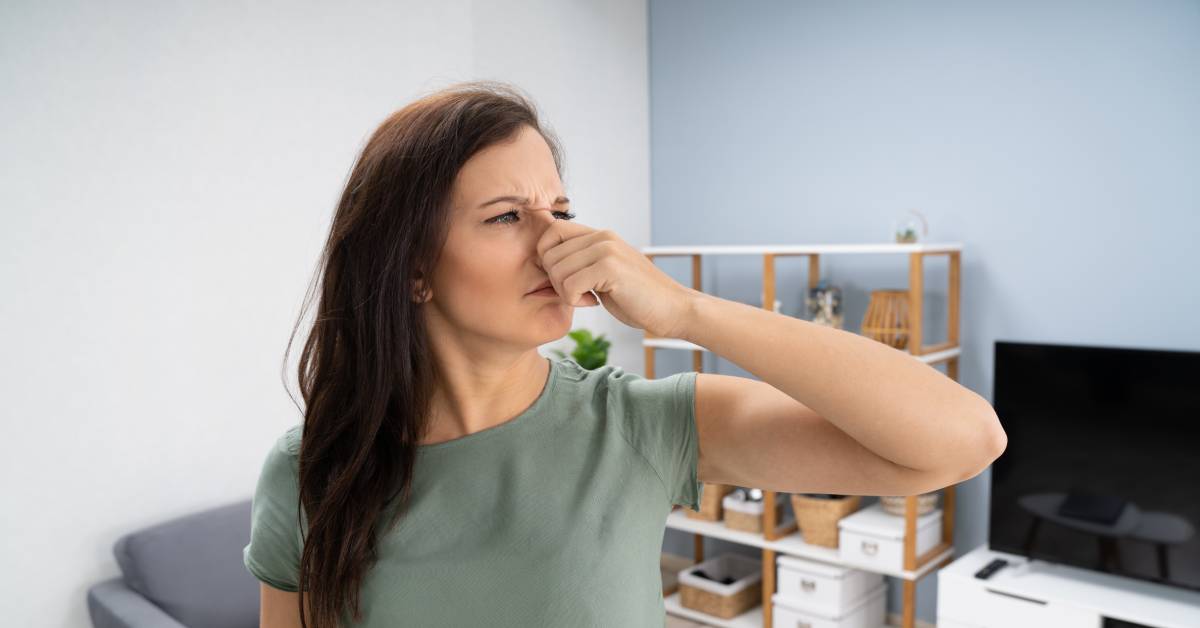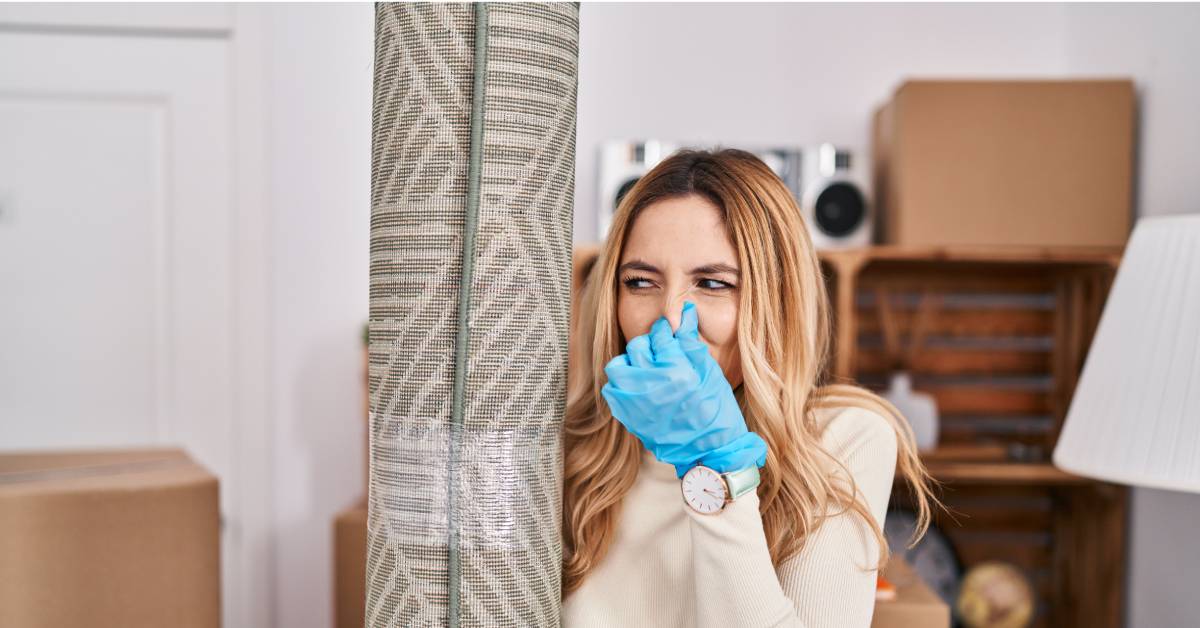
A lingering bad smell in your home can be incredibly frustrating. This guide will explore some of the most common causes of bad odors in the home, providing valuable insights and practical tips to help you identify and eliminate these unpleasant smells. From musty basements to smelly kitchens, we’re going to cover it all, ensuring your home remains a comfortable and pleasant place to live.
1. The Unseen Enemy: Mold and Mildew
Mold and mildew are among the sneakiest culprits when it comes to home odors. These fungi are typically found in bathrooms, basements and even inside walls. They release spores and microbial volatile organic compounds (mVOCs), which cause that distinctive musty smell.
Keeping these areas dry and well-ventilated is necessary for preventing the growth of mildew and mold. Regular cleaning with anti-fungal sprays can also help keep these pesky invaders at bay.
2. Forgotten Food and Spills

Forgotten food or spills is another common cause of bad odors in the home. Food particles can get trapped in various places, such as under appliances, in the crevices of your stove, or even in your garbage disposal.
These particles start to decompose, producing foul odors. Consistently clean these areas and promptly address spills to help maintain a fresh-smelling kitchen. Don’t forget to check the back of your fridge for expired items!
3. Pet-Related Smells
Pets bring joy to our lives, but they can also bring unwanted odors into our homes. Pet urine, dander, and food can contribute to unpleasant smells. Training your pets to use litter boxes or designated areas outdoors can help reduce urine-related odors.
Regular grooming and cleaning of pet bedding can also minimize dander and other smells. But sometimes, removing pet odors requires professional help. When you need reliable odor remediation services, Affinity Bio Solutions has the experience to handle these issues effectively.
4. Stale Air and Poor Ventilation
Poor ventilation can lead to a buildup of stale air, which often carries unpleasant odors. This is especially common in older homes or rooms that are rarely used.
Opening windows and using fans can help improve air circulation and reduce odors. You can also install exhaust fans in kitchens and bathrooms to help remove moisture and cooking smells, making your home smell fresher.
5. Dirty Carpets and Upholstery

Carpets and upholstery can trap odors from various sources, including food, pets, and general daily use. Over time, these trapped particles break down and produce foul smells.
Regular vacuuming and occasional deep cleaning can help keep these surfaces smelling fresh. Steam cleaning is particularly effective at removing deep-seated dirt and odors from carpets and upholstery.
6. Invisible Bacteria in Drains
Drains can harbor bacteria that produce terrible odors, especially when washing food particles or grease down the sink. These bacteria can multiply and create a noticeable smell over time.
Regularly treating your drains with a mixture of baking soda and vinegar can help eliminate these bacteria and keep your drains smelling clean. For persistent issues, consulting a professional can be beneficial.
7. Smoking Indoors
Cigarette smoke is a notorious culprit when it comes to lingering odors in the home. The smoke particles cling to fabrics, walls, and other surfaces, making it difficult to eradicate the smell completely.
If you or someone in your household smokes, consider taking it outside to prevent these odors from permeating your home. Using air purifiers and consistently cleaning affected areas can also help reduce the smell.
8. Trash and Recycling Bins
Trash and recycling bins are obvious sources of bad odors. Even when you empty the bins frequently, residue and spills can build up, leading to unpleasant smells.
Cleaning the inside of your bins with disinfectant and using liners can mitigate these odors. Additionally, consider taking out the trash more frequently to minimize the buildup of smells.
9. Cooking Residues
Cooking certain foods, such as fish or cabbage, can leave an unpleasant smell in your kitchen and throughout your home. Plus, these smells can be particularly difficult to eliminate.
Using ventilation fans or opening windows while cooking can help disperse these odors. Be sure to also wipe down surfaces and clean cookware immediately after use to prevent smells from settling in.
10. HVAC Systems and Filters
HVAC systems play an important role in maintaining air quality in your home. However, if the filters are dirty or the system itself is not well-maintained, they can circulate bad odors throughout your house. Replacing filters and scheduling annual maintenance checks can help ensure your HVAC system is working efficiently and not contributing to unpleasant smells.
11. Plumbing Issues
Leaks and other plumbing issues can create hidden sources of odors in your home. Water damage can lead to mold and mildew growth, while leaks in pipes can cause stagnant water to build up, producing foul smells. Be sure to frequently inspect your plumbing and address any issues promptly to help prevent these odors.
12. Chemical Cleaners and Solutions
Unfortunately, sometimes, the products we use to clean our homes can leave behind unpleasant odors. Strong chemical cleaners can produce lingering smells that are hard to eliminate.
Opting for natural cleaning solutions or those with pleasant scents can help keep a fresh smell in your home. Always ensure proper ventilation when using strong chemicals to avoid unwanted odors.
13. Garbage Disposals
Garbage disposals are convenient but can become sources of bad smells if not maintained properly. Trapped food particles can decompose, producing foul odors. Running your disposal regularly with cold water and occasionally adding a few ice cubes or citrus peels can help clean out trapped particles and keep your disposal smelling fresh.
14. Potted Plants and Soil
While potted plants can enhance the beauty of your home, the soil can sometimes emit foul odors, especially if it stays constantly wet. Overwatering can lead to the growth of mold and bacteria in the soil.
Make sure to properly drain the soil and let it dry out to prevent these odors. You can also choose plants that require less water to mitigate this issue.
Various factors can cause bad odors in the home. By identifying these common culprits and taking proactive steps to address them, you can maintain a fresh and pleasant living environment. If you need help getting rid of any odors, Affinity Bio Solutions is ready to assist you in creating a better-smelling home.
